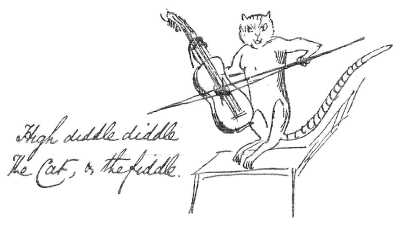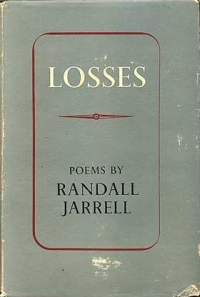Almost two years ago, I was trying to settle the source of a strange quote attributed to a "Sir Henry Reed," regarding the nursery rhyme, "
Hey Diddle Diddle." The quote, which appeared in two journal articles about Mother Goose, is as follows: 'I prefer to think that it commemorates the athletic lunacy to which the strange conspiracy of the cat and the fiddle incited the cow.'
I finally tracked down the original source of this quotation in vol. 117 of the series
Children's Literature Review (Tom Burns, ed. Detroit: Thomson Gale, 2006. p. 60), which reprints a 1955 review by Clifton Fadiman of
The Oxford Dictionary of Nursery Rhymes, edited by Iona and Peter Opie (1952).
Going to the Opie's text, I discover that the
Children's Literature Review misprints the attribution as "Sir Henry Reed." The 1952 and 1997 editions of the Oxford volume (which are identical in this section) have 'The sanest observation on this rhyme seems to have been made by Sir Henry
Reid'.
The double error of including the honorific "Sir" and the misspelling "Reid" leaves me to believe this is probably not our Henry. It seems more likely attributable to Sir Herbert Read, or to another Sir, altogether. And, actually, since Read wasn't knighted until 1953 and the Oxford edition was published in 1952, we are probably looking for some witty 19th century gentleman.
This was made possible using Gale's
Literature Criticism Online, a database which provides access to ten collections of literary criticism, including
Contemporary Literary Criticism,
Poetry Criticism, and
Twentieth-Century Literary Criticism, as well as
Children's Literature Review. Access to Gale's databases is provided by many public and university libraries.
An excellent find in the series
Poetry Criticism: in the entry for Randall Jarrell is a reprint of a 1948 review by Stephen Spender of Jarrell's collection
Losses, from
The Nation (1 May 1948). The collection contains many of Jarrell's famous poems which came out of his experiences in the Army Air Force during World War II, including "The Dead Wingman," "Pilots, Man Your Planes," and "
Eighth Air Force."
Spender compares Jarrell to Robert Lowell, calling him a "modern" poet in a "certainly" American landscape; but he also compares his language to the Victorian poets:
Mr. Jarrell often reminds me of Tennyson and Browning. Or rather this will not seem strange if I quote from "Orestes at Tauris," which is a long, odd failure, merging into the language of prize poems with which the English Victorian writers once took the stage:
So he looked; and yet in all that press
At Argos or Mycenae, or in all the isles
You never saw her like: a face so fair!
She wet your hair, and smoothed it with her hands,
Water ran down your face, and it looked pale
Under those dark and darkening locks; you shook them free,
And how ghastly it looked—your pale anxious face!
This is Victorian Prize Poetry with a big V and two big P's, and to judge from Mr. Jarrell's remarks about Henry Reed when he does the same thing considerably better, I cannot believe Mr. Jarrell likes it himself.
"Considerably better!" Spender is, of course, referring to
a dismissive review of Reed's
A Map of Verona and Other Poems in
The Nation just a month earlier, in which Jarrell compares Reed to "a nap after dinner."









